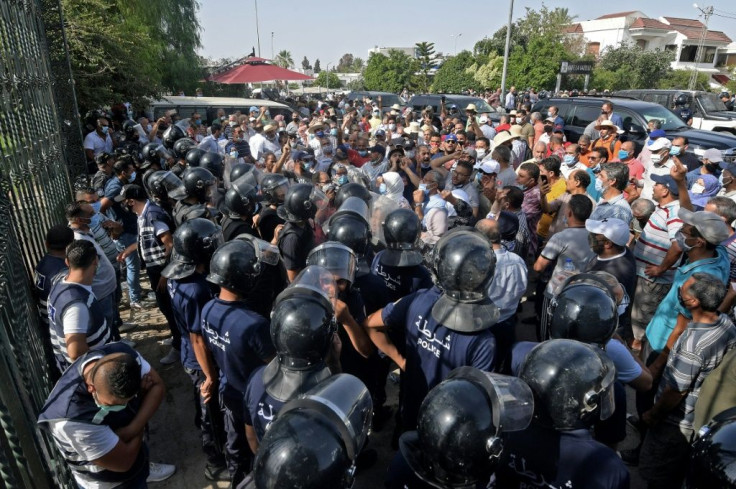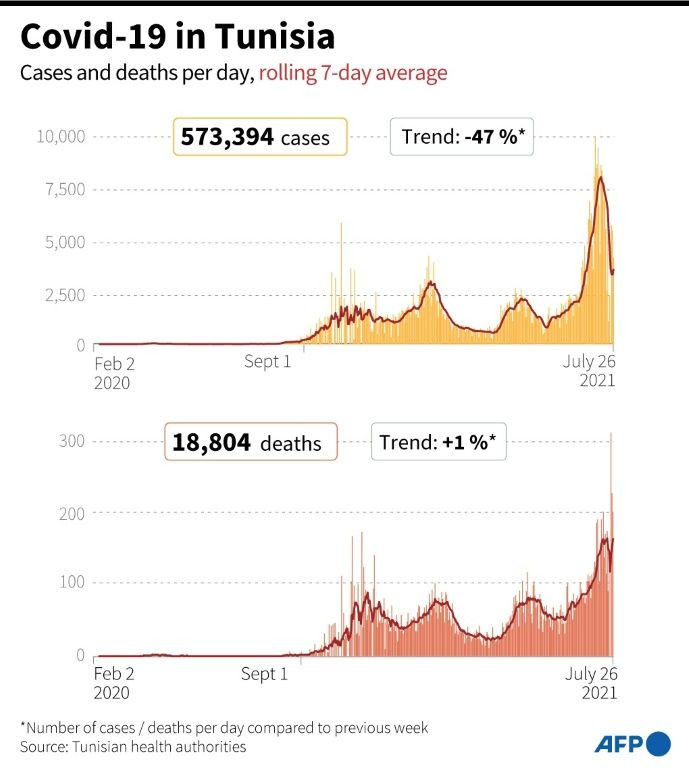Will Tunisia Crisis End Arab Spring's Democratic Success Story?
Tunisia, the cradle of the 2011 Arab Spring revolts and long seen as its sole democratic success story, has been plunged into crisis with the threat of more turmoil ahead.
President Kais Saied on Sunday dismissed the prime minister, suspended the elected parliament for 30 days and warned that any armed opposition would be met with "a rain of bullets".
The power grab sparked international concern and charges by the ruling political party of a "coup d'etat".
"Tunisia must not squander its democratic gains," warned the US State Department.
Here are some key questions about the political turmoil in the economically battered and pandemic-hit North African country of 12 million, and on what may happen next.
The small Mediterranean country has had nine governments since the 2011 popular revolution that toppled dictator Zine El Abidine Ben Ali.
Its rocky transition has been plagued by an economic malaise that has been deepened by the Covid pandemic, which in recent weeks has seen deaths surge to one of the world's highest official per-capita rates.

The heavily indebted country has been hit hard by a fall in tourism and is seeking its fourth aid programme in 10 years from the International Monetary Fund.
Saied, a jurist elected in 2019 with no previous governing experience, has been at loggerheads for the past six months with the main party in parliament, the moderate Islamist Ennahdha.
Street protests broke out Sunday against the government of Ennahdha-backed Prime Minister Hichem Mechichi, with people venting their anger over its poor Covid response.
Many Tunisians were furious after seeing photos of Mechichi gathering his ministers in a luxury seaside resort, in defiance of Covid restrictions, as health workers battled to save lives.
The president, who also commands the army, declared he had sacked the premier, sparking celebrations by tens of thousands of jubilant supporters, but also charges of an orchestrated power grab by his opponents.
On Monday, street clashes broke out outside the army-barricaded parliament. The same day police shuttered the Al Jazeera TV bureau in Tunis, and Saied also fired the defence and justice ministers.
Ennahdha called the shock events "a coup against Tunisian democracy and its constitution".
Western and regional powers, while voicing alarm, have so far generally avoided that term, with an EU spokesperson urging "all Tunisian actors to respect the constitution, its institutions and the rule of law".

Saied argued he acted under Article 80 of the country's 2014 constitution, which allows the head of state to take unspecified exceptional measures in the event of an "imminent threat".
The president later said the legislature's suspension was declared for 30 days.
Whether to renew it after that would in theory be up to Tunisia's Constitutional Court -- an institution which parliaments have however failed to establish over the past seven years.
Political scientist Selim Kharrat argued that "Saied's decisions are not constitutional", pointing out that "Article 80 states that parliament should be in open session," which it was not.
Fadil Aliriza, editor of news website Meshkal, said it was too "early to say whether it is a coup.
"There is a concentration of power" in Saied's hands, Aliriza argued, adding that now all depends on "whether it is permanent or temporary".
Saied said he would assume executive powers and name a new prime minister, but has so far failed to present a roadmap out of the crisis.
He has the backing of the army and the implicit support of the powerful Tunisian General Labour Union.
Kharrat said "it remains to be seen whether Mr Saied will enter into negotiations, or whether he will continue to take unilateral decisions.
"It is too early to say whether this can be a positive shock, and there is a real risk of drifting towards a form of autocratic rule."
Saied's supporters ransacked Ennahdha offices on Sunday, and there was street violence Monday, raising fears of further escalation.
Aliriza said that "Ennahdha has been trying to mobilise support, but they know it's not in their interests to instigate violence. It has often worked against them."
International Crisis Group analyst Michael Ayari said "there is an objective of restoring the efficiency of the state, but it will be necessary to ensure the involvement of a large number of actors".
"We are in the unknown, with a risk of excesses, including bloody ones."
Amnesty International voiced alarm about Saied's actions and his threats, as well as the raid on Al Jazeera's bureau, which it labelled "an outrageous assault on the right to freedom of expression".
"The hard-won freedoms and human rights gains of Tunisia's 2011 uprising are at risk," the rights group warned.
© Copyright AFP {{Year}}. All rights reserved.





















